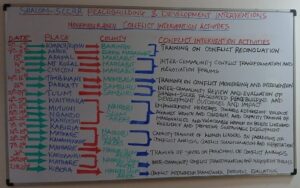Shalom-SCCRR was founded in 2009 by Rev. Dr. Patrick Devine, SMA, presently the International Chairman with over 30 years of experience working to transform conflict and poverty in Africa.
Shalom-SCCRR is an inter-religious organization, strictly non-sectarian, registered in Kenya and closely aligned with civil society organizations. There is a highly qualified team of board members drawn from peace, development, religious, finance, and economic backgrounds, who oversee with exemplary professionalism, the project implementation, and financial administration. Rev. Oliver Noonan, MA (Ph.D. Candidate), the executive director, oversees day-to-day activities, development and direction of organizational strategy, policies, and team growth.
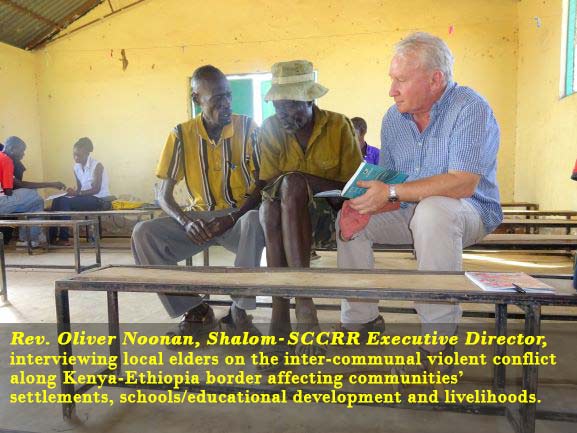
Shalom-SCCRR benefits from the cooperation of the governments of eastern Africa that form the Intergovernmental Authority on Development (IGAD) comprising of Djibouti, Eritrea, Ethiopia, Kenya, Somalia, South Sudan, Sudan and Uganda. The work of Shalom-SCCRR has been endorsed by IGAD through Memorandums of Understanding (MoUs).
Shalom-SCCRR also partners with international and regional colleges and universities on peace-building courses, as well as religious associations and councils in Africa.
The design of our conflict interventions is informed by rigorous empirical research which also lends itself to informing governments and IGAD policy practices in the context of localized inter-ethnic/inter-communal conflict occurrences.
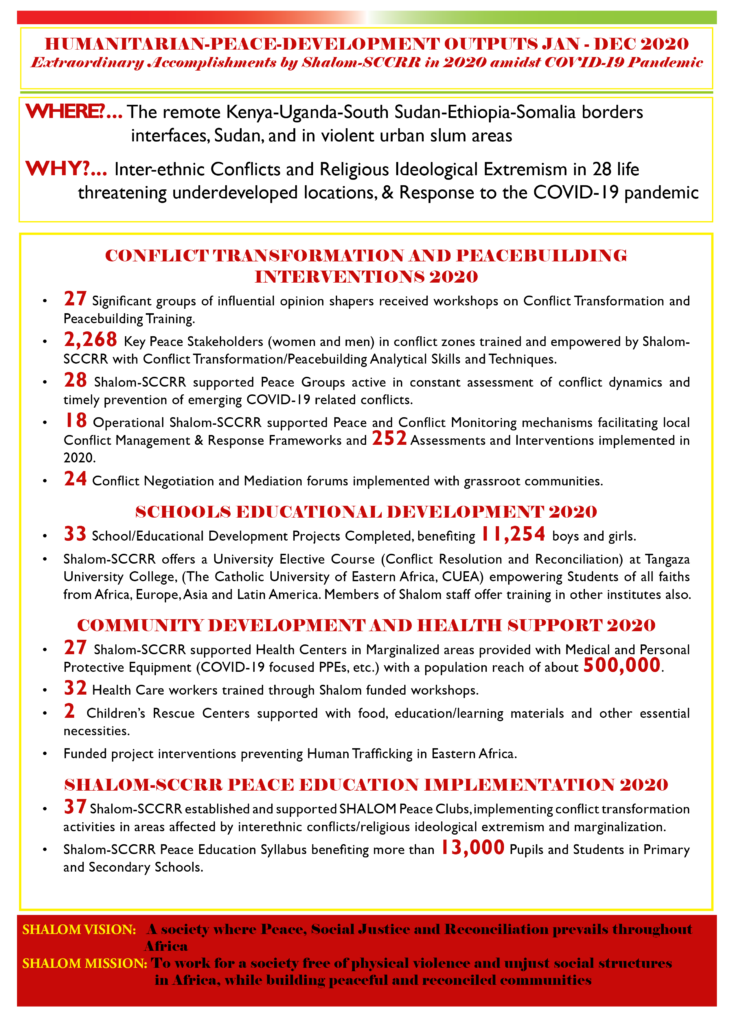
Our 2020 annual review highlights include conflict interventions and development projects we implemented in Kenya-Uganda-South Sudan-Ethiopia-Somalia interfaces, Sudan and in violent Urban Slums. The well planned and designed interventions focused on:
Conflict prevention, management, transformation and Peacebuilding
Schools/Educational Development
Peace education in schools and,
Community Development and Health support
Shalom-SCCRR prioritizes on the most marginalized and vulnerable in the society suffering from extreme poverty and violent conflict. Despite the challenging environments and harsh conditions, we have succeeded through our comprehensive and well adapted approach —a nexus— in humanitarian-peace-development interventions (developed from extensive and broad field experience) -in the areas/locations of operation.
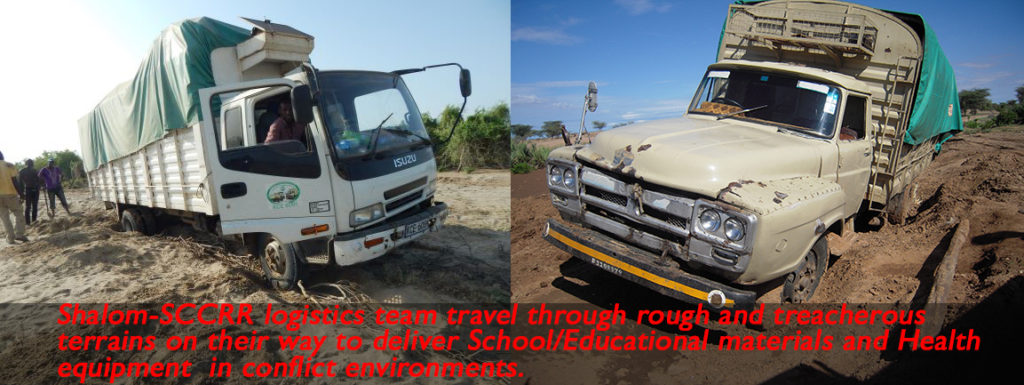
2020 Shalom-SCCRR Activities and Outputs
In 2020, Shalom-SCCRR applied an extensive amount of time, resources and expertise to support COVID-19 responses in counties affected by violent conflict. Through the 28 Shalom-SCCRR established Peace Groups (2,268 members involved), we were able to blend our peacebuilding approaches with COVID-19 public health responses while mitigating the effects of conflict.
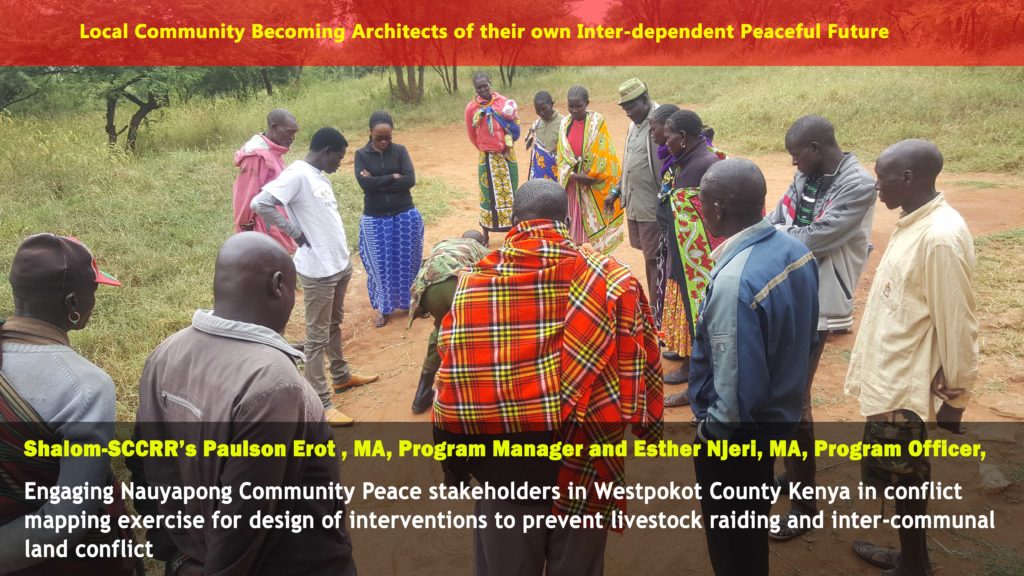
Shalom-SCCRR is actively implementing Sustainable Development Goal 4 [SDG4] which puts emphasis on quality education — inclusive and equitable education — for all. Education is and remains a fundamental human right, and is a prerequisite for the achievement of sustainable development.
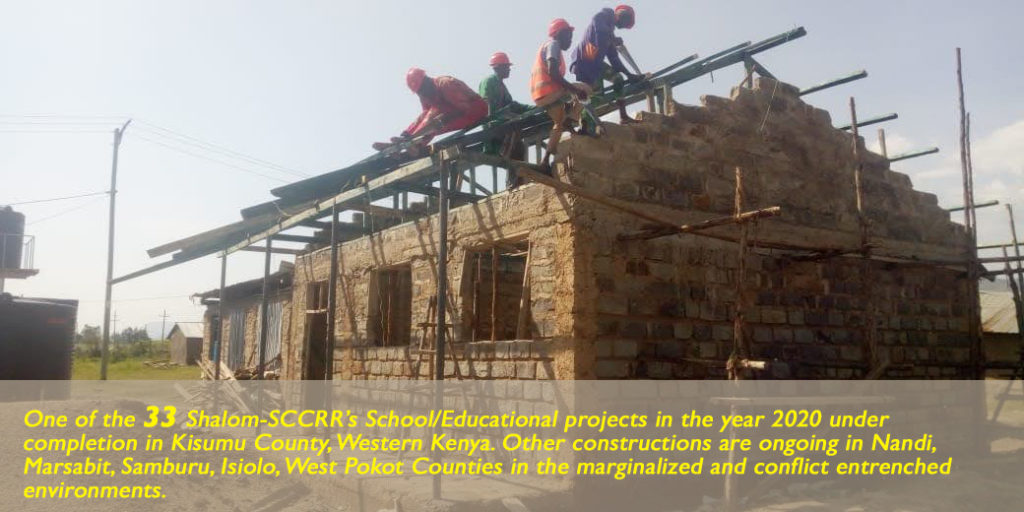
In 2020, Shalom-SCCRR completed 60 projects 33 of which were school/educational developments in poor and marginalized zones of Northern Kenya, South Omo in Ethiopia, South Sudan, Sudan, and in the urban slums.
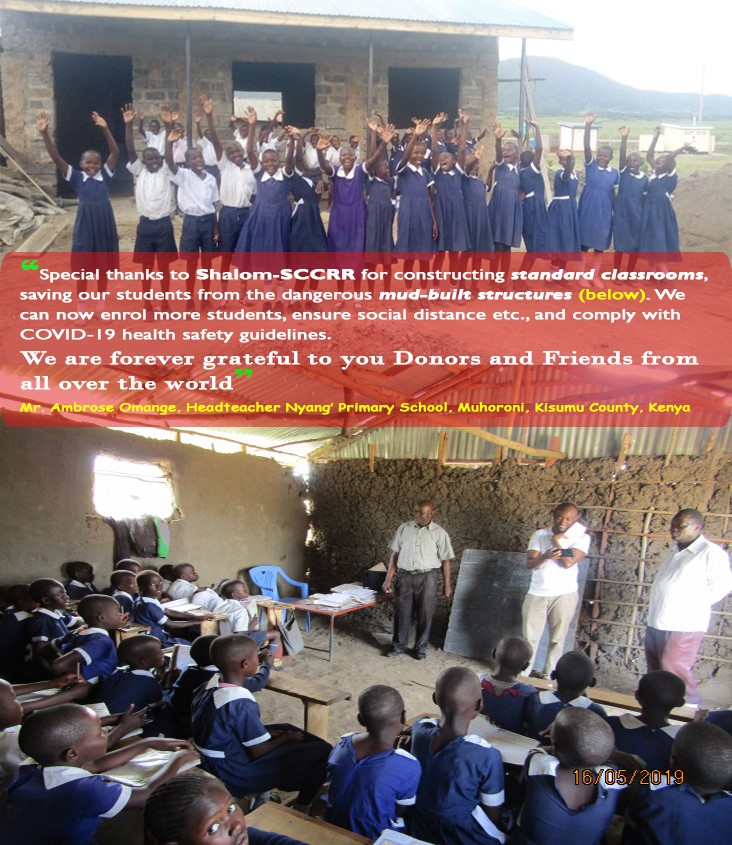
As a response to the pandemic, we implemented 27 health projects by supplying Medical and Personal Protective Equipment (COVID-19 focused PPEs) to ill-equipped health centers in the Northern Kenya. The interventions benefitted a population estimated at 500,000 people living in marginalized, very remote and harsh environment.
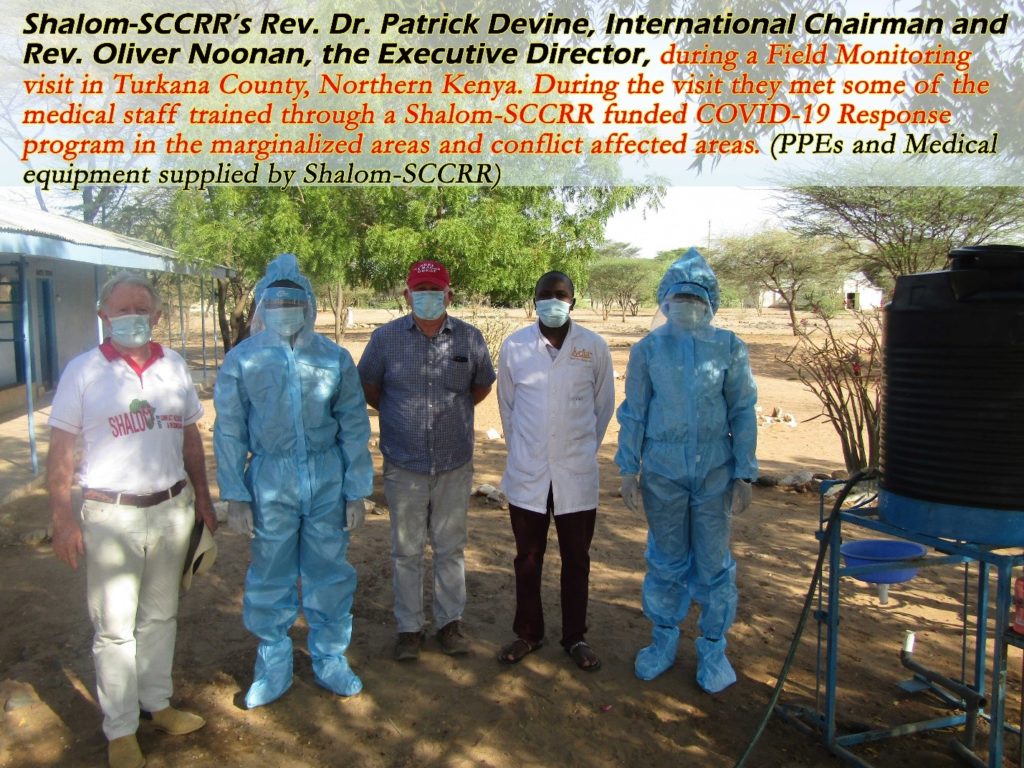
We continued to engage and support 37 Shalom-SCCRR established School Peace Clubs through which proficiently trained members have become agents of conflict transformation in their schools and communities. The impact of Shalom-SCCRR Peace Education syllabus is evident in the change of attitude and behavior in pupils and students in and out of school. They also have a tremendous positive impact and influence on their parents, teachers and fellow school mates.
Impact/Results of Shalom-SCCRR’s Transformative Work
Successes in our conflict transformation, peacebuilding and development projects were assessed at the following results levels: outputs, outcomes and impact. Outputs presented in the info-chart above were products realised directly after implementation of our activities. Outcomes and impact on the other hand, were cumulative results achieved from either single key output or multiple outputs in the short-term, medium-term or long-term timelines.
To achieve these results, we invested significant amount of time, human resources and finances.
Shalom-SCCRR deems its mission a success not just at the output level, but when the targeted outcomes and corresponding impact(s) are achieved.
As a standard practice, the Metrics of success in our interventions are identified, designed, planned, implemented, monitored and evaluated, with the local communities/beneficiaries participation in each of the stages.
Following are outcomes summarised from the annual field assessments across our humanitarian, peace, development interventions.
Outcomes of Shalom-SCCRR Interventions in Conflict Transformation and Peacebuilding: a summary
- Increased active participation of local communities affected by conflict in every step of Shalom-SCCRR conflict transformation and peacebuilding activities.
- Enabling environment for resumption and reduced interruption of socio-economic activities.
- Establishment of local inter-communal institutions for continuously facilitating non-violent conflict interventions, consequently, communities opting for non-violent means (dialogue, negotiation, advocacy etc) to prevent and address conflict.
- Empowered communities becoming drivers of Peace Agendas in their local contexts.
- Increased capacity of the local communities to initiate, design, implement, monitor and locally sustain peace initiatives/actions.
- Communities with ability to develop local indicators of peace and development within a framework originating from their local context.
- Championed for gender awareness in peacebuilding processes by advocating for more equitable peacebuilding institutions and structures in Counties and at local levels.
- Countered patriarchal socio-cultural stereotypes on women with reference to their participation in decision-making roles and peacebuilding processes.

- Empowered women as negotiators in peace processes in the local contexts (responding to UNSCR 1325). Currently, Shalom-SCCRR has managed to have over 40% women participation in peacebuilding and development interventions.
- Prevention of youth radicalization and religious ideological extremism in the urban slums through broad stakeholder engagement and capacity building trainings to local communities’ key influential opinion shapers, religious leaders, local government administrators and civil society actors.
Outcomes of Shalom-SCCRR School Educational/ Development Projects: a summary
Provision of learning materials
Learners’ textbooks and Teachers Instructional Materials
- Improved academic performance of schools located in remote and marginalized areas of Northern Kenya, Sudan, South Sudan and Southern Ethiopia persistently affected by violent inter-communal conflicts.
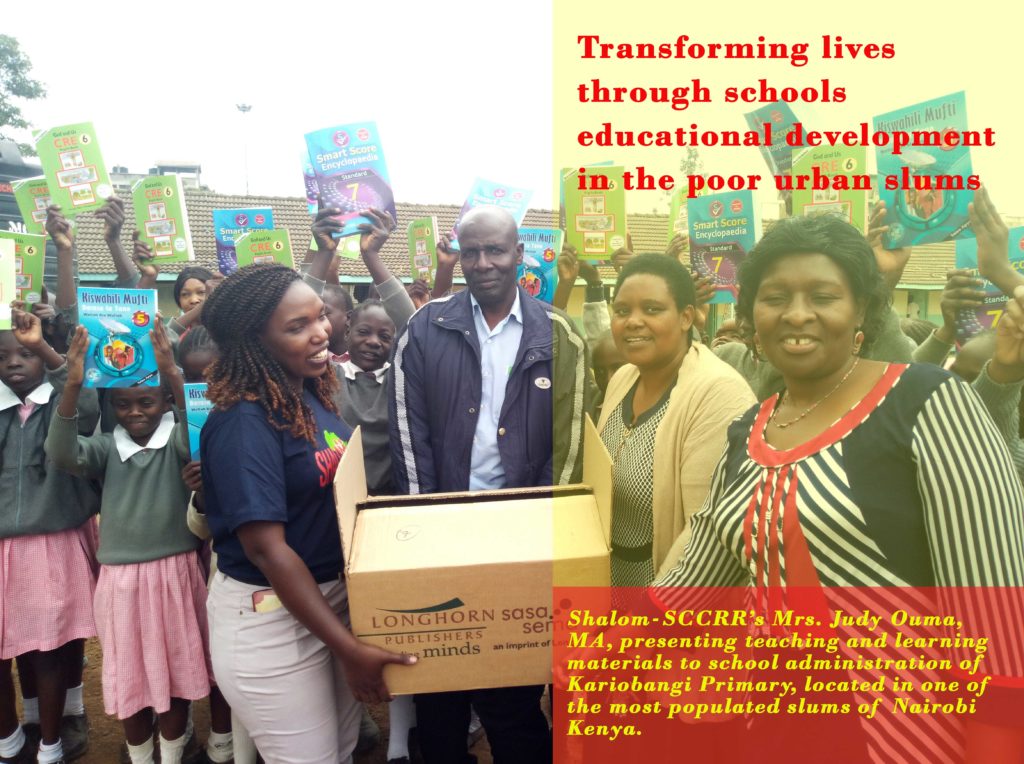
Construction and rehabilitation of School Physical Facilities:
Classrooms, Educational/Science Laboratories, Libraries, Boarding facilities (Live-in), Teachers accommodation houses
- Enhanced teaching and learning in schools.
- Increased enrolment and retention of learners.
- Motivated teachers due to improved working environment.
- Learners protected from sun, rain, heat and cold and other extreme weather conditions.
- Improved performance in science subjects due to the availability of laboratories and science equipment.
- Sustained Teachers retention and motivation.
- Increased enrolment and retention of girls in schools due to availability of boarding facilities.
- Protection of girls from harmful socio-cultural practices such as Female Genital Mutilation (FGM) and forced early marriages.
Installation of Solar Lighting in School in Remote and Marginalized areas
- Students and teachers with clean and cheap source of energy compared to the costly and polluting paraffin lanterns.
- Created opportunities for young herders from pastoralist communities to access evening classes in the Shalom-SCCRR supported Shepherd/ Informal Schools.
- Pupils and students’ participation in evening classes prompting improved academic performance.
School Fencing Projects
- Improved security due to reduced cases of vandalism, human, livestock and wild animals encroachment.
- Better management and control of pupils and students within the school compound.
Provision of Sanitary Towels
- Retention of girls in schools
- Improved school attendance and consequently better academic performance
- Improved self-esteem/confidence in girls especially in mixed schools (boys and girls’ schools)
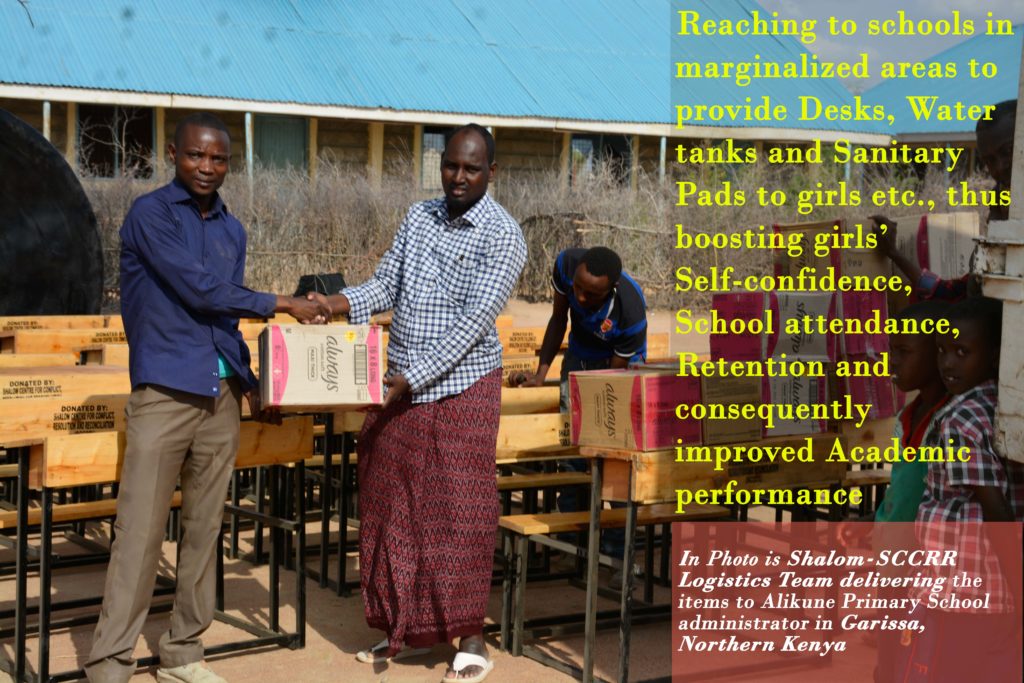
Outcomes of Shalom-SCCRR Peace Education in Schools
- Positive relations/interactions among pupils from conflicting communities
- Pupils with increased capacity for problem solving in conflict situations
- Pupils and students from different ethnic communities increased collaboration and cooperation in and out of school activities.
- Pupils and students participating in integrative negotiation and peer mediation sessions
- Pupils and students’ development of intercultural sensitivity leading to acceptance/tolerance of the ‘other’
- Individual development of the learners in terms of self-esteem, open-mindedness, empathy and critical thinking
Some of the common documented indicators of impact that were identified by communities in the areas where we are implementing conflict transformation, peacebuilding and development projects were:
Community members’ acquired capacity to map and understand the history and root causes of their conflict; local community members level of involvement in every step of a conflict transformation process; inter-communal/joint socio-economic development; improved mutual understanding between the local people and the leadership (government and political leaders); local peace agreements sustained; communities opting for non-violent conflict interventions mechanisms; and locally owned and sustained peace and development results.
Sharing Lessons Learned
Emphasizing Community Negotiation and Mediation Approach in Local Peacebuilding
Communities that have suffered from long term intractable conflicts depict greater levels of trust for their own people and own internal processes. Consequently, negotiation and mediation processes that are facilitated by their own trusted community leaders have higher opportunities of success and sustainability than those that are led by external experts. Community facilitated negotiation and mediation have thus become more acceptable and productive among such communities.
Solidifying Process Outcomes in the Problem Solving Process
Problem solving is a long-term process which ultimate impact is often slow and gradual to achieve. Consequently, conducting it as a process with greater investment in cultivating process outcomes turns out to be more productive and motivating to participants rather than conducting it as a goal.
Prioritizing Local ownership
Local ownership is central in the sustainability of peace and development outcomes. Local ownership nonetheless does not mean involving just the local community. To sustain peace developments, all key stakeholders within a conflict context/environment must be actively involved through a process of ownership of outcomes and impact. Shalom-SCCRR therefore, believes in multi-stakeholder engagement and involvement in the design of conflict interventions, peacebuilding and, socio-economic structural transformation.
Integrating Peace into local development planning and governance
Inclusive and broad stakeholder engagement and participation is a crucial approach towards developing community-based and owned peace initiatives that can be adopted in the local governance and development plans leading to a sustainable structural change. When communities drive a peace process agenda, they prefer a locally constituted community-based mechanism for resolving disputes because they can relate better with its structures, processes and outcomes.
Long-term Commitment to a Community is key to Positive Peacebuilding
Transformation of attitudes, behaviours, cultures and more so violence enabling structures require unlimited journeying with communities that are victims of intractable conflict. Timed interventions have less opportunity of bringing meaningful change due to the complexity of multi-level transformation required in the peacebuilding process.
Appreciation
Shalom-SCCRR Team Shalom-SCCRR’s success is a product of teamwork by highly qualified professionals, years of field experience, partnerships and trust with local communities, religious leaders, state and non-state key stakeholders and, our openness to learning and being innovative to adapt to the ever-dynamic peace and development needs.
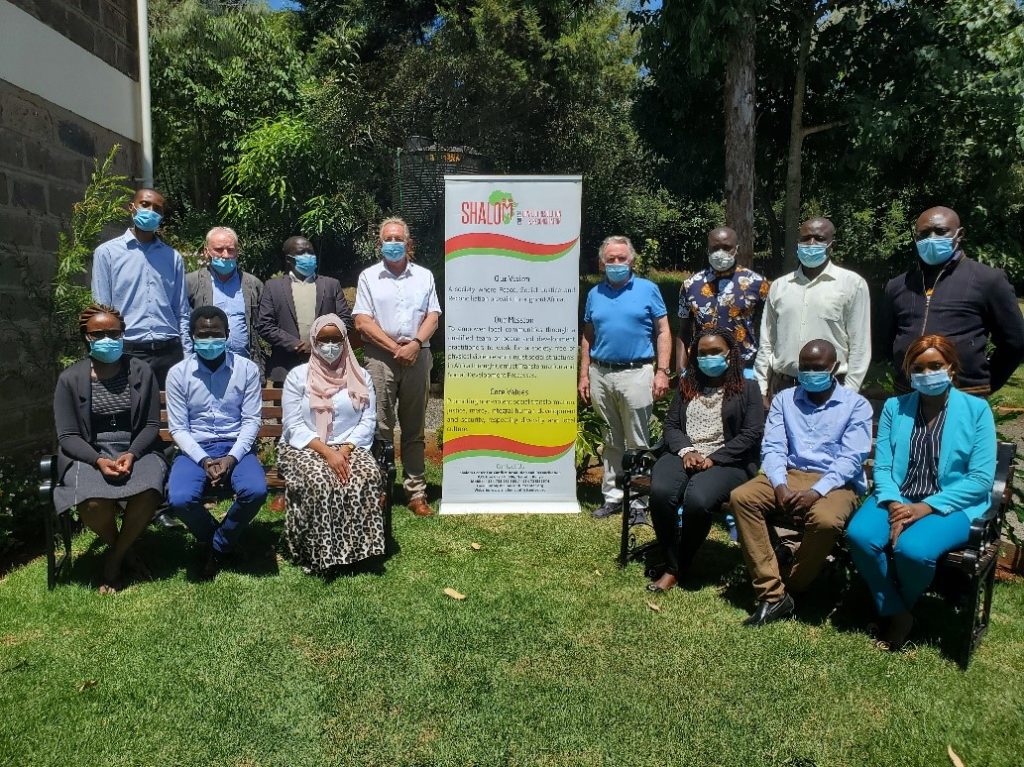
To our Friends, Donors and Supporters
The achievements summarized above could not have been realised without the big-hearted support of our friends, donors and supporters all over the world. It is through your generosity we are able to reach our goals and enable communities who needed most to have a future of hope and fulfillment. In fact, all the tremendous work for peace and sustainable development impacting thousands of children and families, is your work and life changing contribution.
You truly make the difference for us, and we are extremely grateful!

By: Mr. Francis Mwangi, MA – Shalom-SCCRR Monitoring Evaluation and Learning Coordinator
***************************************************************
Rev. Oliver Noonan, MA – Shalom-SCCRR Executive Director
Prof. W.K. Omoka, PhD – Shalom-SCCRR Director of Research
Mr. Godfrey Okoth, MA – Shalom-SCCRR Director of Programs
Mr. Francis Mwangi, MA – Shalom-SCCRR Monitoring Evaluation and Learning Coordinator
Rev. Dr. Patrick. R. Devine – Shalom-SCCRR International Chairman
SHALOM-SCCRR TEAM IN EASTERN AFRICA DURING 2020
Board of Directors
Rev. Dr. Patrick Devine MA, BD, BA, D.MS, Chairman
Prof. Robert Mudida PhD, MSC, MA, BD, Board Member (Kenya)
Dr. Michael Comerford MA, BD, BA, Board Member, (South Sudan)
Rev. Oliver Noonan, MA, BD, D.MS, (PhD Candidate) Board Member, (Eastern Africa)
Ms. Rosaline Serem, MBA, BA, Board Member, (Kenya)
Mr. Sean White, MSC, BA, Board Member (Kenya)
Rev. Janus Machota, BD, BA Board Member, (Tanzania)
Management
Rev. Oliver Noonan, MA, BD, D.MS, Executive Director
Prof. Wanakayi K Omoka, PhD, MA, BA, Director of Research
Mr. Godfrey Okoth, MA, BA, Director of Programs
Ms. Joyce Wamae, MA, BA, Program Manager (Urban Settlement Program)
Mr. Paulson Erot, MA, BA, Program Manager (Northern Kenya Program)
Mr. Francis Mwangi, MA, BA, Monitoring, Evaluation and Learning Coordinator
Ms. Judith Akedi-Linus, MA, BA, Program Officer, Team Leader
Mr. Austin Ngacha, MA, BA, Program Officer, Team Leader
Mr. Arthur Magero, MA, BA, Program Officer, Team Leader
Ms. Esther Kibe, MA, BA, Program Officer, Team Leader
Mr. Kennedy Odhiambo, MA, BA, Program Officer, Team Leader
Ms. Asha Said Awed, MA, BA, Program Officer
Mr. Kipkoech Kipruto, ACCA, (Association of Chartered Certified Accountants),
Finance Administrative Manager
Mr. Remy Ndiema CPA (Certified Public Accountants), B.Com, Assistant Accountant Mr. Ken Otieno, Transport / Logistics Coordinator, Further Studies
International Volunteer Consultants
Mr. Patrick Geysen, MA, Senior Advisor to IGAD (Intergovernmental Authority on Development – 8 Countries) Former Deputy Head of the EU delegation to Djibouti.
Ms. Matilda Brolin, L.L.M. (Harvard Law School, Swedens Ministry of Foreign Affairs, D.R.Congo)
Ms. Nancy Mirera, MA, Counselor-Psychology, Embul-bul Education & Counselling Center, (Kenya)
Ms. Fabiana Pardi Otamendi, L.L.M. (Harvard Law School, UN Human Rights, White & Case LLP, France)
Ms. Sheena McMullen, MA, (Peace and Reconciliation Studies, N. Ireland/UK)
Rev. Michel Savadogo, MA, BA, BD (Shalom, Cote D’Ivoire, West Africa)Dr. Conrad Bosire, MA, BA, (Constitutionalism and Devolution, Kenya, East Africa) Rev.
Rev. Dr. Michael McCabe, BA, BD (Ireland; Inter-Faith Dialogue)
Also see the following link: (https://shalomconflictcenter.org/shalom-sccrrs-contribution-to-women-in-conflict-transformation-and-peacebuilding/)

